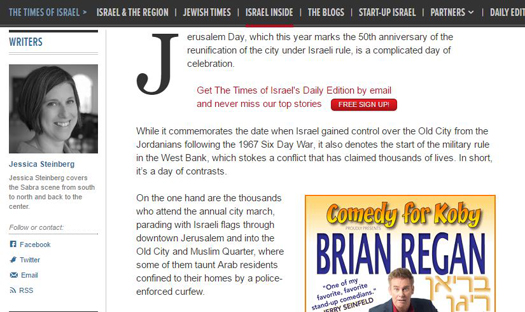Times of Israel has removed the false claim that a “police-enforced curfew” was imposed on residents of the Old City’s Muslim Quarter during the Jerusalem Day march celebrating the 50th anniversary of the city’s reunification. The article (“A jubilee for the non-jubilant: Alternative events for Jerusalem Day,” May 18), had incorrectly reported:
On the one hand are the thousands who attend the annual city march, parading with Israeli flags through downtown Jerusalem and into the Old City and Muslim Quarter, where some of them taunt Arab residents confined to their homes by a police-enforced curfew.

Police spokesman Micky Rosenfeld confirmed to CAMERA that there was no such curfew, neither during this year’s Jerusalem Day march, nor during past years. The last record of any curfew in Jerusalem that we can locate dates back to 1988. Before, that, when Jordan controlled eastern Jerusalem, King Hussein imposed curfews in the 1960s, as the New York Times reported April 22, 2013 from its archives from 50 years earlier (“1963 King Ends Parliament in Jordan“). In 2013, The Financial Times corrected the false claim that there are curfews in Jerusalem.

In response to communication from CAMERA’s Jerusalem staff, Times of Israel removed the false reference to a curfew. The amended story language now refers to “Arab residents who are de facto confined to their homes.”

It is unclear how marchers manage to taunt Arabs who are confined within their homes. (Do they enter private property? Shout through open windows?) In any event, a participant in this year’s flag parade confirmed to CAMERA that he while he did not see Arab residents out on the specific streets on the parade’s route, roads which completely filled up with marchers, he did see Arab residents did go about their usual business on side streets off the parade’s route.
For additional Times of Israel corrections prompted by CAMERA, please see here.
